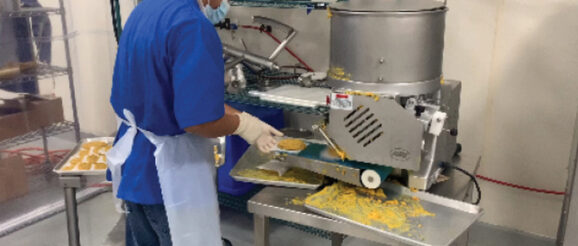Food Innovation Center: A Vital Resource for a Safe Food Supply Chain Amidst a Global Pandemic

The New Jersey Agricultural Experiment Station (NJAES) 2020 Annual Report spotlights the many stories of outreach and resilience during COVID-19. To read more, see the NJAES 2020 Annual Report.
As New Jersey declared a state of emergency to contain the spread of COVID-19, the food industry had to quickly adjust its go-to-market strategies and just about every aspect of its operations. Fortunately, the Food Innovation Center (FIC), a NJAES food business incubator and USDA and FDA food and beverage processing facility, was designated an essential facility and remained open—thus enabling the staff to continue working with food companies to address the challenges of the pandemic. The FIC team supported its dozens of specialty food businesses and entrepreneurs, and thanks to such expert assistance, not a single FIC client went out of business during this time.
Rutgers Food Innovation Center (FIC) client producing a sliced, acorn-fed, Iberian ham at the FIC.
The center developed policies and production requirements that allowed manufacturing to continue,providing a critical pipeline of food and beverage products headed for grocery store shelves and
e-commerce distribution, eventually landing in home kitchens. While a few businesses stalled slightly in the early stages of the pandemic, they were able to regain their market. Others experienced an uptick in orders, resulting in increased manufacturing production.
FIC team members provided critical support to the food industry in the area of food safety, including creating a comprehensive informational section to its website to assist food businesses through this challenging period. Current information from the FDA, USDA, and other federal and state agencies was posted and continually updated. The site was highlighted on the New Jersey Food Processors website as a go-to resource on food safety for companies during the pandemic.
The center also had to rapidly adjust the way in which it delivered its education programs. All on-site training was moved to a virtual format, serving more than 700 participants since April 2020. Both center locations in Piscataway and Bridgeton are at capacity and have continued to mentor start-up and established food businesses with marketing, training, R&D, manufacturing, and sales support. This nationally recognized program is a stellar example of how NJAES provides practical support and resources that contribute to the health, safety, and economic growth of the state, even during the most challenging of times.
